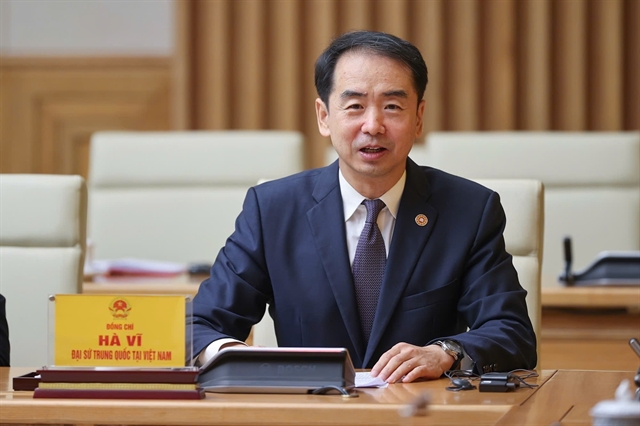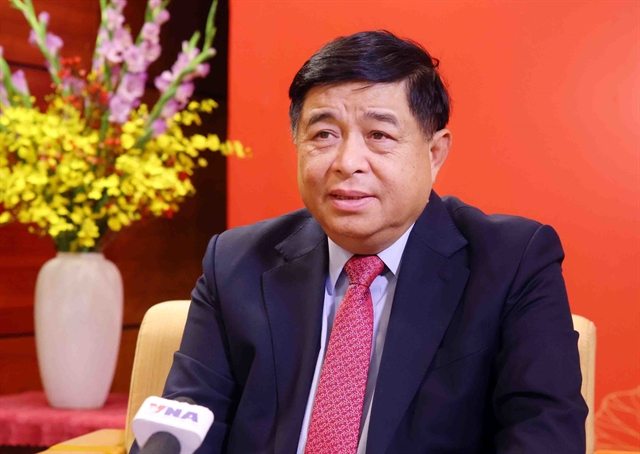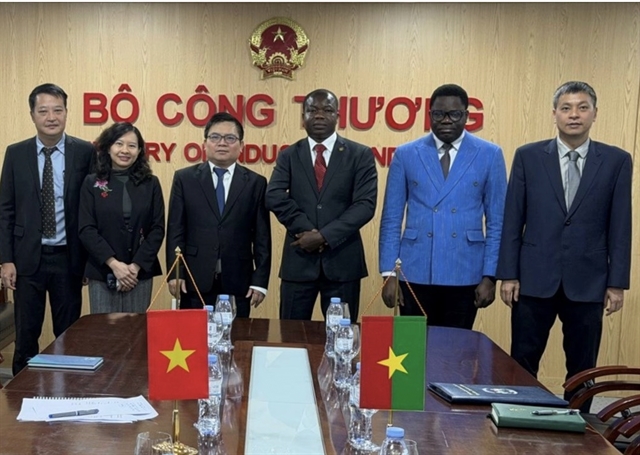 Economy
Economy

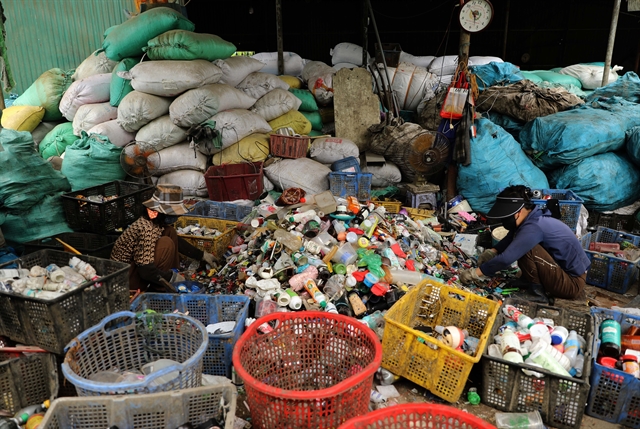 |
| Plastic waste is sorted for recycling plants, turning discarded packaging into new resources for the circular economy. VNA/VNS Photo Thành Phương |
The implementation of Extended Producer Responsibility (EPR) is opening new opportunities to generate economic value, enhance brand reputation and contribute to environmental protection and public health.
EPR is becoming one of the most important policy tools to promote packaging recycling, reduce plastic waste and build a circular economy in Việt Nam.
Lý Thị Hồng Điệp, deputy editor-in-chief of the Nông nghiệp và Môi trường (Agriculture and Environment) newspaper, said that with rapid economic growth and urbanisation, the volume of solid waste, especially from beverage packaging, had been rising sharply. Managing, collecting, and recycling packaging had become a pressing challenge that would require the participation of the entire society.
.JPG) |
| In 2024, SABECO — one of Việt Nam’s leading beverage companies — achieved a 100 per cent rate of reusing or recycling all primary and secondary packaging, including glass bottles, aluminium cans, plastic crates, and cartons. Photo courtesy of the firm |
“The beverage industry not only makes a major contribution to the economy but also generates large volumes of packaging waste. Under the 2020 Law on Environmental Protection, EPR is not just a mandatory obligation but also an opportunity to increase the value of the circular economy and strengthen corporate reputation,” Điệp said.
“We hope this workshop will deliver practical initiatives and useful recommendations to help reduce pollution, move towards the net zero target, and build a green and sustainable Việt Nam.”
In reality, awareness of EPR has only grown among businesses in recent years. According to Chu Thị Vân Anh, vice chairwoman and general secretary of the Vietnam Beverage Association (VBA), a quick survey in 2023 revealed that more than 60 per cent of businesses only became aware of EPR from 2022. Nevertheless, the majority expressed support for the policy.
However, over 80 per cent faced difficulties in implementation due to high compliance costs, lack of suitable recycling partners, and shortages of dedicated staff.
“By 2024–25, the situation has improved significantly. Most businesses now understand the regulations and have participated in training programmes, including those organised for VBA members," Anh said.
"Around 80 per cent of small and medium-sized enterprises opted to contribute to the recycling fund, 20 per cent combined fund contributions with in-house initiatives, while 10 per cent authorised professional recyclers.”
“This shows that businesses are actively experimenting with models suited to their scale,” she added.
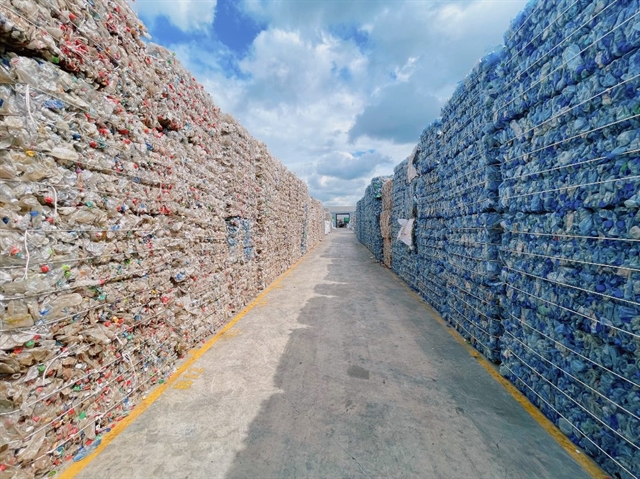 |
| Used plastic bottles and packaging stacked for processing at DUYTAN Recycling’s plant. Photo courtesy of the firm |
Since the establishment of the Packaging Recycling Alliance (PRO Việt Nam) in 2019, many pioneering firms have applied innovative recycling initiatives.
In 2024, some factories trialled the circulation of up to 850 tonnes of aluminium cans while reusing glass bottles, plastic crates and other packaging – sometimes exceeding current regulatory requirements. Heineken’s closed-loop “can-to-can” model has been cited as a successful example.
Yet, challenges remain.
“Businesses face legal risks in making online fund contributions, lack transparency in fund oversight, face infrastructure limitations in collection and recycling and must bear high costs," Anh said. "Moreover, Việt Nam does not yet have aluminium recycling plants to produce rolled aluminium for reuse.”
Stronger incentives
To address these issues, she recommended that the upcoming EPR Decree should include incentives for the use of recycled packaging materials, especially rPET. Businesses contributing to the fund or undertaking their own recycling should be able to deduct the costs in their financial reports.
Mandatory recycling rates should be aligned with businesses’ actual capabilities, and the EPR fund should allocate part of its resources for infrastructure and technology investment. Partial exemptions from independent collection obligations should also be considered for companies that both recycle and use recycled packaging.
“The fund should prioritise supporting recycling initiatives, encourage the production of recycled-content packaging, expand pilot glass recycling projects, and invest in collection and treatment facilities. At the same time, the informal waste collection workforce should be supported, alongside public awareness campaigns on sorting and recycling,” Anh said.
From a research perspective, Hồ Quốc Thông of the Centre for Applied Economic Research and Policy, under the University of Economics HCM City, suggested Việt Nam should mandate minimum recycled-content requirements for certain products, encourage eco-friendly packaging design, and allow businesses to integrate EPR into their corporate social responsibility programmes.
“Policies should prioritise reuse over recycling. On the market side, incentives are needed to boost domestic industries using recycled materials, for example subsidies for recycling, establishment of centralised collection points, and deposit–refund systems to encourage public participation,” Thông said.
“These mechanisms should draw stronger private sector involvement to expand scale and ensure sustainability in recycling,” he added.
From the regulator’s standpoint, Hồ Kiên Trung, deputy director of the Department of Environment under the Ministry of Agriculture and Environment, highlighted that the beverage industry was one of the largest generators of packaging waste.
“In the past three years, although EPR is still in its early stage, recycling rates have increased significantly, and part of the waste has even been exported, creating economic value. However, materials such as glass, multi-layer cartons, and aluminium cans are still underused. Bottle-to-bottle recycling of plastics largely has to be carried out overseas, in countries like Thailand and Singapore, which reduces economic efficiency and raises costs,” Trung said.
“To break through, Việt Nam needs stronger incentives for domestic recycling, reducing reliance on exports and making better use of secondary resources,” he said.
Trung also revealed that many foreign investors were showing interest in the sector, with some recycling industrial parks being prepared for construction and expected to be operational next year.
Meanwhile, relevant ministries were reviewing adjustments to environmental taxes and fees to encourage recycling. By mid-next year, the amended Law on Environmental Protection was expected to finalise new provisions related to product and packaging recycling.
“The Department of Environment will continue listening to associations, businesses, and experts to resolve bottlenecks, improve EPR policy, and create the foundation for a strong, sustainable, and internationally integrated recycling industry,” Trung added.
It is clear that the circular economy poses challenges for all businesses, including large corporations, given the significant costs of EPR compliance. Yet, it remains an inevitable trend as Việt Nam pursues sustainable development, reduces plastic waste, and protects the environment.
With businesses taking proactive steps, supported by a stronger legal framework, transparent monitoring, and active community participation, the packaging recycling sector is poised to accelerate. Its progress will contribute to achieving the net zero target and building a truly circular national economy. VNS


